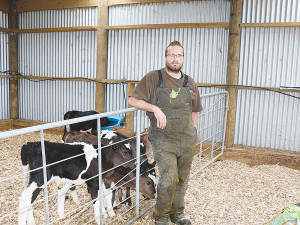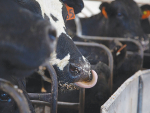He expects 400 calves this season and will be keeping detailed records of new-born calves using modern and traditional methods.
Mercer is not the person in charge of animals (PICA) but as farm manager, he’s a PICA delegate. The farm deals with just one NAIT location.
He says when calves are born they use brass tags in the first few days as an identifier to match them to their mothers. They are then tagged with Allflex birth tags.
“We have several ways of capturing the calf’s details.
“The staff on farm use WhatsApp to capture info when a calf is born and this can be readily shared in real-time, so everyone knows what is happening. On wet days, we still use the old-style calving notebook.”
Mercer says as soon as they tag calves with birth tags, the tag number and all the relevant details are recorded using the MINDA live app on his cellphone and this information synchs through into NAIT.
“I’ll usually get an email notification from the NAIT system about two hours after they’ve been recorded in MINDA - confirming the calf’s registration is now in the NAIT system.
“If one of the animals loses a tag in the field, we’ll retag with a replacement NAIT tag and take a picture of the new tag using a cellphone.
“This way, we can record the new tag number and match it to the missing tag in NAIT.”
Calves sold mainly go to saleyards and some are reared and contracted for Wagyu beef.
Mercer urges farmers to “just get on and do it” when it comes to NAIT.
“If you are calving, register the calves’ tag numbers in MINDA or NAIT and declare the month, year of birth and the NAIT location number [birthplace].
“Remember too, if you’re finishing calves for beef, to change the animal production type from dairy. You can do this now using the MINDA Live app.”
He says it’s essential to be able to trace animals back to their original source.
“If we have a biosecurity incursion or we’re managing a livestock disease outbreak like Mycoplasma bovis, NAIT helps us work out where the animals have been, and the other animals they have come into contact with, and what we need to do to prevent the spread. Lifetime animal traceability protects our business and builds New Zealand’s biosecurity capability.”


















